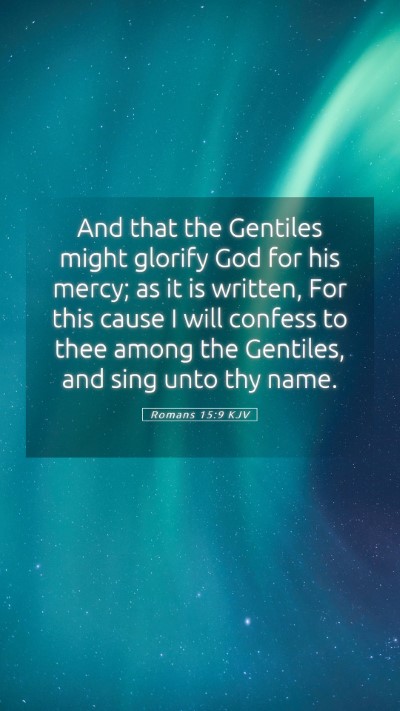Understanding Romans 15:9
Romans 15:9 states:
"And that the Gentiles might glorify God for his mercy; as it is written, For this cause I will confess to thee among the Gentiles, and sing unto thy name." (KJV)
This verse highlights a crucial aspect of the New Testament, reflecting on the inclusion of the Gentiles in the plan of salvation through Jesus Christ. The Apostle Paul, in this epistle, emphasizes the purpose of Jesus' ministry – that His coming was not only for the Jews but also a call to the Gentiles.
Key Themes and Insights
- Inclusion of the Gentiles: Paul reiterates the universal nature of the Gospel, affirming that salvation and the worship of God extend beyond Israel to all nations. The mercy of God is a central theme, demonstrating His willingness to save all who believe, regardless of their background.
- God’s Mercy: The reference to glorifying God for His mercy is vital; it acknowledges that mercy is fundamental to our relationship with God and invites all to partake in this divine grace.
- Prophetic Fulfillment: The quote from the Old Testament underlines that the inclusion of the Gentiles was foretold, as shown in scripture. This connection emphasizes the continuity between the Old and New Testament narratives and reinforces the idea that God’s plan was always inclusive.
- Worship and Praise: The mention of confessing and singing highlights worship as a response to God’s goodness and mercy, encouraging believers to express their gratitude and reverence through praise.
Bible Verse Meanings and Explanations
The verse serves multiple purposes in biblical exegesis:
- Paul’s Apostolic Mission: This verse aligns with Paul's mission to reach the Gentiles, marking a pivotal point where the early church began to embrace a broader audience.
- Understanding Scripture: Romans 15:9 provides insight into how the early church interpreted the Old Testament promises concerning the nations.
- Encouragement for Believers: The fact that Gentiles are included opens the door for all to find hope in Christ, reinforcing the church's mission to share the Gospel universally.
Commentaries on Romans 15:9
Matthew Henry's Commentary
Henry notes that this verse reflects the joy and gratitude expressed by the Gentiles for God's mercy. The act of praising God signifies a response of acknowledgment and worship, essential in a believer's life. Furthermore, he underlines the importance of inclusivity in the faith, as the Gentiles could now also share in the blessings once deemed exclusive to the Israelites.
Albert Barnes' Commentary
Barnes discusses the scriptural references that Paul uses to validate his claims about the Gentiles. He points to specific quotations from the Old Testament, implying that the ministry of Jesus was intended for all humanity, thus affirming the covenantal promises made with Abraham and his descendants were ultimately for a broader audience.
Adam Clarke's Commentary
Clarke emphasizes the deep significance of praising God in light of His mercy. He notes that the call to glorify God is both a privilege and an obligation of believers, reflecting on how this verse encourages believers to extend their worship beyond mere acknowledgment of God's deeds to a heartfelt expression of thanks and adoration.
Application and Significance
Romans 15:9 invites us to reflect on the following:
- Worship as a Response: How does God's mercy in your life inspire you to worship? Reflecting on personal experiences can inspire deeper gratitude and lead to a life characterized by worship.
- Inclusivity in Faith: This verse challenges believers to embrace diversity within the church, recognizing that everyone is called to glorify God, regardless oftheir differences.
- Mission Mindedness: Just as Paul was committed to spreading the Gospel, modern believers are encouraged to share the good news with all, ensuring that the message of mercy reaches every corner of the globe.
Bible Cross References
- Isaiah 11:10: A prophetic reference that includes the Gentiles in the worship of God.
- Psalms 18:49: This verse reflects the idea of praising God among the nations.
- Psalm 117:1: This short psalm calls all nations to praise the Lord.
In conclusion, Romans 15:9 encapsulates the essence of God’s mercy and the call to worship that transcends cultural and ethnic boundaries. Through this verse, believers gain profound insight into the heart of the Gospel and the inclusive nature of God's redemptive plan.


